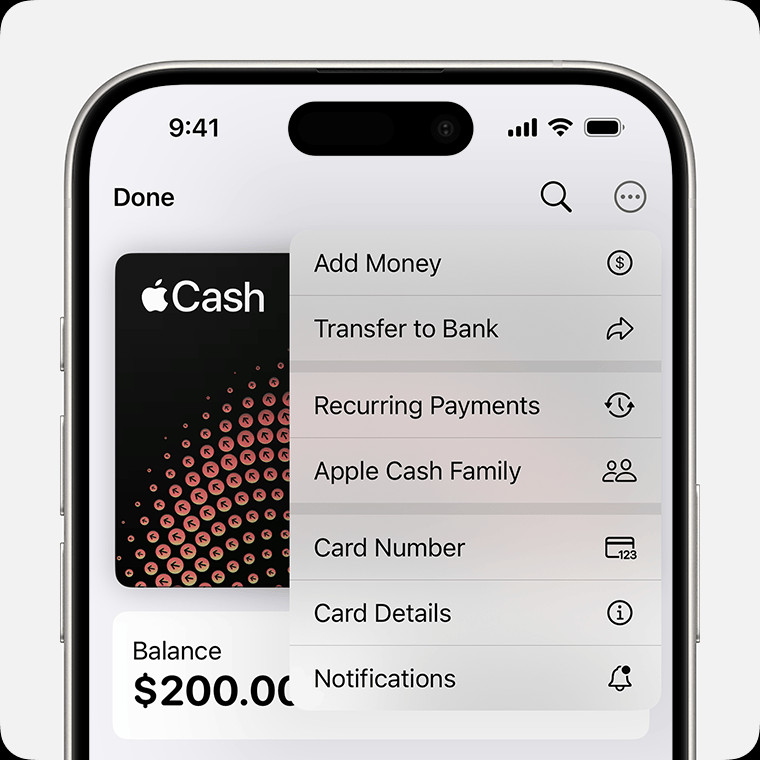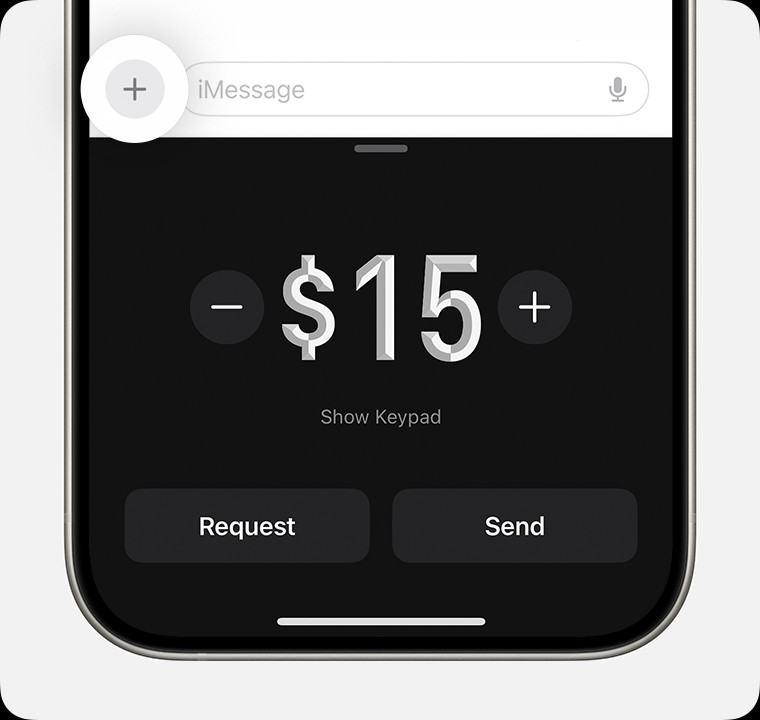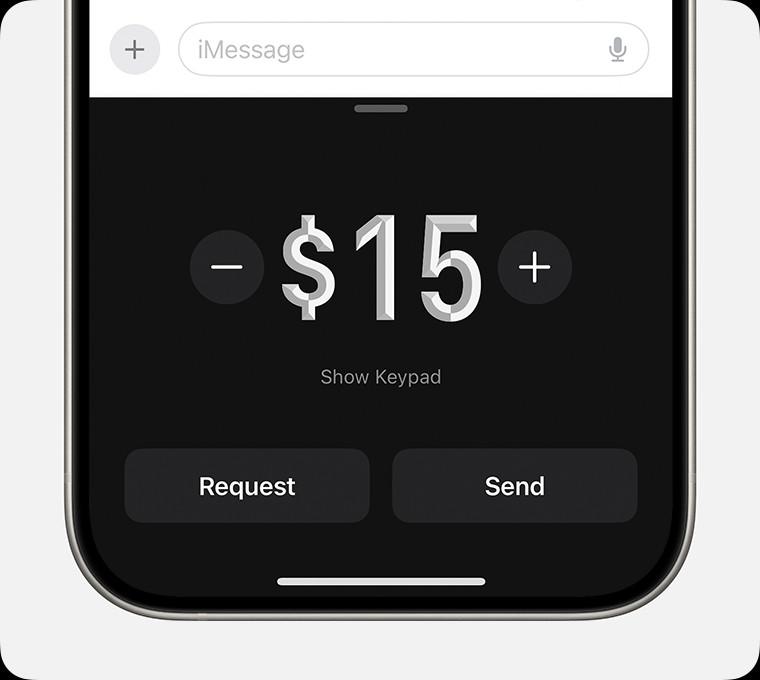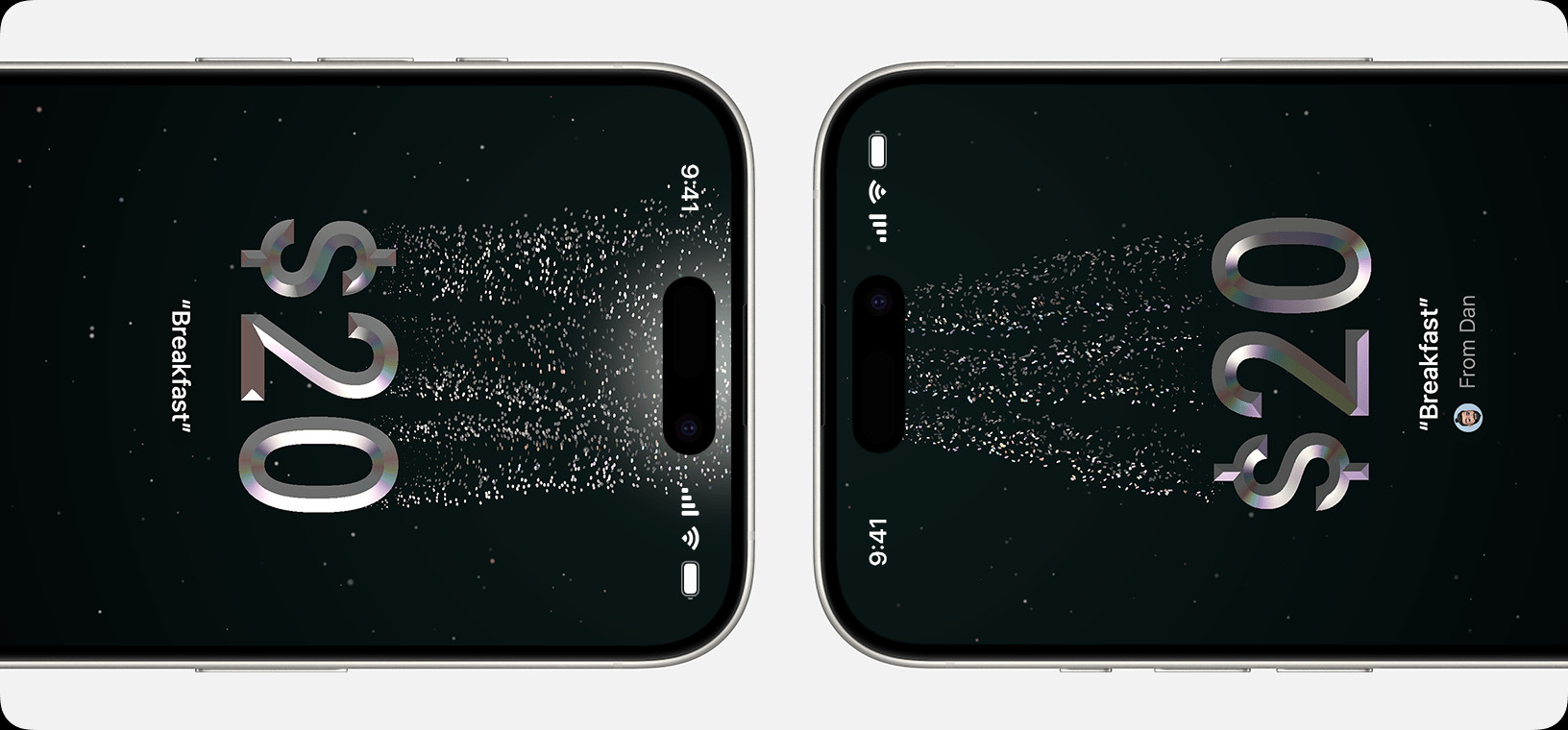Are you looking for secure and convenient ways to receive money? At money-central.com, we understand the importance of having reliable options for managing your finances. Whether it’s through digital wallets, bank transfers, or other innovative methods, we’ve got you covered with expert advice and resources for easy money management. Let’s explore the various methods to receive funds, focusing on their security, speed, and ease of use.
1. What is Apple Cash and How Can I Use It to Receive Money?
Apple Cash is a digital payment service integrated into Apple devices, allowing users to send and receive money. With Apple Cash, you can receive funds directly into your digital wallet and use them for Apple Pay transactions or transfer them to your bank account. According to Apple Payments Services LLC, a subsidiary of Apple Inc., Apple Cash is available for users 18 and older in the U.S. with eligible devices. Let’s examine how to set it up and receive funds.
-
Setting Up Apple Cash:
- Open the Wallet app on your iPhone.
- Follow the prompts to set up your Apple Cash account.
- You may need to verify your identity for full functionality and FDIC insurance eligibility.
-
Receiving Money:
- When someone sends you money, it appears in your Apple Cash card within the Wallet app.
- You can choose to accept payments automatically or manually in your card details settings.
- For manual acceptance, open the Messages conversation and tap “Accept” within 7 days.
 Image of iPhone showing the More menu with Recurring Payments selected
Image of iPhone showing the More menu with Recurring Payments selected
1.1. What Are The Benefits of Using Apple Cash?
Using Apple Cash offers several advantages, including ease of use, security, and integration with Apple devices. Apple Cash transactions are encrypted and protected by Face ID, Touch ID, or your passcode, ensuring secure transfers. According to Apple’s security guidelines, Apple Cash uses advanced encryption and fraud prevention technologies to protect your financial information. It’s a convenient and secure way to handle your finances.
1.2. Are There Any Limitations With Apple Cash?
While Apple Cash is a convenient option, it has limitations, including its availability only in the U.S. and restrictions for users under 18. According to Apple’s Terms and Conditions, Apple Cash Family accounts have sending and receiving limits of up to $2000 within a rolling seven-day period. Be aware of these constraints before relying on Apple Cash for larger transactions.
1.3. How Do I Transfer Money From Apple Cash To My Bank Account?
Transferring money from Apple Cash to your bank account is straightforward. Open the Wallet app, tap your Apple Cash card, and select “Transfer to Bank.” Enter the amount you want to transfer and confirm your bank details. According to Apple Support, transfers typically take 1-3 business days to complete, depending on your bank. This provides a seamless way to manage your digital funds and move them to your traditional bank account.
2. What Are The Best Online Payment Platforms To Receive Money?
Online payment platforms have revolutionized how we send and receive money, offering speed, convenience, and security. Some of the best platforms include PayPal, Venmo, Zelle, and Cash App. According to a study by Statista, PayPal is the most widely used online payment platform, with over 400 million active users worldwide. Let’s explore these popular platforms in detail.
- PayPal:
- Benefits: Widely accepted, secure transactions, buyer protection.
- Drawbacks: Fees for certain transactions, potential holds on funds.
- Venmo:
- Benefits: Social payment app, easy for splitting bills, instant transfers.
- Drawbacks: Limited buyer protection, potential privacy concerns.
- Zelle:
- Benefits: Direct bank transfers, no fees, fast transactions.
- Drawbacks: Limited to U.S. bank accounts, no buyer protection.
- Cash App:
- Benefits: Versatile app, Bitcoin transactions, Cash Card for spending.
- Drawbacks: Potential security risks, fees for instant transfers.
 Image of iPhone sending money in the Messages app
Image of iPhone sending money in the Messages app
2.1. How Secure Are Online Payment Platforms?
Online payment platforms employ various security measures, including encryption, fraud monitoring, and two-factor authentication, to protect your transactions. According to a report by the Federal Trade Commission (FTC), these platforms have significantly reduced fraud rates compared to traditional payment methods. However, users should still practice caution and avoid sharing sensitive information to minimize risks. It’s important to stay informed about the security features of each platform and take proactive steps to protect your account.
2.2. What Are The Fees Associated With These Platforms?
Fees vary among online payment platforms, with some charging for specific transactions like instant transfers or international payments. PayPal, for instance, charges fees for receiving money for goods and services, while Zelle is generally free for direct bank transfers. According to each platform’s fee structure, it’s essential to understand these costs to avoid unexpected charges.
2.3. How Do I Choose The Right Platform For My Needs?
Choosing the right online payment platform depends on your specific needs, such as transaction frequency, security preferences, and recipient location. If you frequently send money to friends and family, Venmo might be a good choice. For business transactions, PayPal’s buyer protection and wider acceptance could be more suitable. Consider these factors to make an informed decision.
3. Can I Receive Money Through Traditional Bank Transfers?
Traditional bank transfers, including wire transfers and Automated Clearing House (ACH) transfers, remain a reliable method for receiving money. ACH transfers are commonly used for direct deposits and online bill payments, while wire transfers are suitable for larger amounts and international transactions. According to the National Automated Clearing House Association (NACHA), ACH transfers are a secure and efficient way to move funds between bank accounts.
3.1. What Is The Difference Between Wire Transfers And ACH Transfers?
Wire transfers and ACH transfers differ in speed, cost, and use cases. Wire transfers are faster but more expensive, often used for urgent or international transfers. ACH transfers are slower and less costly, ideal for routine transactions. According to the Federal Reserve, wire transfers are processed individually, while ACH transfers are processed in batches, affecting the speed and cost.
3.2. How Do I Set Up A Bank Transfer To Receive Funds?
To set up a bank transfer, you’ll need to provide your bank name, account number, and routing number to the sender. For international transfers, you may also need your bank’s SWIFT code. Banks use secure networks to process these transfers, ensuring the funds are safely deposited into your account. Verify all the information before initiating the transfer.
3.3. What Are The Advantages Of Using Bank Transfers?
Bank transfers offer several advantages, including high security, reliability, and the ability to transfer large amounts. Banks have robust security measures to protect against fraud and unauthorized transactions. According to the FDIC, funds in bank accounts are insured up to $250,000 per depositor, providing additional security. These features make bank transfers a preferred choice for substantial transactions.
4. Are Mobile Payment Apps A Viable Option To Receive Money?
Mobile payment apps, such as Google Pay, Samsung Pay, and Apple Pay, offer a convenient way to receive money directly on your smartphone. These apps use Near Field Communication (NFC) technology to facilitate contactless payments and secure transfers. According to a report by Juniper Research, mobile payment apps are increasingly popular, with transaction volumes expected to reach trillions of dollars in the coming years.
4.1. How Do Mobile Payment Apps Work?
Mobile payment apps work by linking your credit or debit card to your smartphone, allowing you to make secure transactions. To receive money, you simply share your payment information with the sender, who can then transfer funds to your account. These apps use tokenization and encryption to protect your financial information. It’s a seamless and efficient way to handle transactions.
4.2. What Security Features Do They Offer?
Mobile payment apps offer advanced security features, including biometric authentication, tokenization, and encryption, to protect your financial information. Tokenization replaces your card number with a unique digital token, making it difficult for fraudsters to access your actual card details. These security measures provide a safe and reliable way to manage your money.
4.3. What Are The Potential Drawbacks Of Using Mobile Payment Apps?
While mobile payment apps are convenient, they have potential drawbacks, including limited acceptance by merchants and reliance on smartphone technology. Some older point-of-sale systems may not support NFC technology, restricting where you can use these apps. It’s important to be aware of these limitations when considering mobile payment options.
5. Can I Receive Money Internationally?
Receiving money internationally involves several options, including wire transfers, online money transfer services, and international money orders. Each method has its own advantages and disadvantages regarding cost, speed, and convenience. According to the World Bank, remittance flows to low- and middle-income countries have been steadily increasing, highlighting the importance of international money transfers.
5.1. What Are The Best Services For International Money Transfers?
Several services specialize in international money transfers, including Wise (formerly TransferWise), Remitly, Xoom (a PayPal service), and WorldRemit. These services offer competitive exchange rates, low fees, and fast transfers. Based on user reviews and industry reports, it’s essential to compare these services to find the best option for your specific needs.
- Wise (formerly TransferWise):
- Benefits: Transparent fees, mid-market exchange rates, fast transfers.
- Drawbacks: Limited cash pickup locations, account verification required.
- Remitly:
- Benefits: Fast transfers, multiple payment options, user-friendly interface.
- Drawbacks: Higher fees for some countries, transfer limits may apply.
- Xoom (a PayPal service):
- Benefits: Wide network, reliable service, integration with PayPal.
- Drawbacks: Higher fees compared to other services, exchange rate markups.
- WorldRemit:
- Benefits: Extensive global network, multiple delivery options, competitive rates.
- Drawbacks: Fees can vary widely, transfer limits may apply.
 Image of iPhone requesting money in the Messages app
Image of iPhone requesting money in the Messages app
5.2. What Factors Affect International Money Transfer Fees?
Several factors affect international money transfer fees, including the amount being transferred, the destination country, the payment method, and the service provider. Exchange rates also play a significant role, as fluctuations can impact the final amount received. Keeping informed about these factors can help you minimize costs and maximize the value of your transfer.
5.3. How Can I Ensure The Security Of International Transfers?
Ensuring the security of international transfers involves using reputable services, verifying recipient details, and monitoring transactions. Always use secure websites and avoid sharing sensitive information via email or unsecured networks. According to the International Association of Money Transfer Networks (IAMTN), reputable services comply with strict regulatory standards to protect against fraud and money laundering.
6. What About Receiving Money Via Cryptocurrency?
Cryptocurrency, such as Bitcoin and Ethereum, offers an alternative method for receiving money, providing potential benefits like low fees and fast transactions. Cryptocurrency transactions are recorded on a decentralized blockchain, offering transparency and security. According to a report by Cambridge Centre for Alternative Finance, cryptocurrency usage has been steadily growing, with millions of users worldwide.
6.1. How Do Cryptocurrency Transfers Work?
Cryptocurrency transfers involve using digital wallets to send and receive funds. To receive money, you need to provide the sender with your wallet address, a unique identifier for your cryptocurrency account. Transactions are verified by a network of computers, ensuring the integrity of the blockchain. It’s important to securely manage your private keys to protect your cryptocurrency holdings.
6.2. What Are The Advantages Of Receiving Money Via Cryptocurrency?
Receiving money via cryptocurrency offers several advantages, including low fees, fast transactions, and increased privacy. Cryptocurrency transactions often have lower fees compared to traditional banking methods, especially for international transfers. Additionally, transactions are typically processed faster, with some cryptocurrencies offering near-instant transfers. However, it’s crucial to understand the risks involved.
6.3. What Are The Risks Associated With Cryptocurrency?
Cryptocurrency investments and transactions come with inherent risks, including price volatility, regulatory uncertainty, and security vulnerabilities. Cryptocurrency prices can fluctuate significantly, leading to potential losses. According to the Securities and Exchange Commission (SEC), it’s important to be aware of these risks before investing in or using cryptocurrencies.
7. Can I Still Receive Money Via Money Orders?
Money orders remain a viable option for receiving money, especially for those without bank accounts or access to online payment methods. Money orders are purchased for a specific amount and can be cashed at banks, credit unions, and retail locations. According to the United States Postal Service (USPS), money orders are a safe and reliable way to send and receive funds domestically.
7.1. Where Can I Purchase And Cash Money Orders?
Money orders can be purchased and cashed at various locations, including post offices, banks, credit unions, and retail stores like Walmart and Western Union. Fees for purchasing money orders vary depending on the location and the amount of the money order. It’s important to compare fees and choose a convenient location.
7.2. What Are The Benefits Of Using Money Orders?
Money orders offer several benefits, including accessibility, security, and traceability. They are accessible to individuals without bank accounts and provide a secure way to send and receive funds. According to the USPS, money orders can be traced if lost or stolen, providing added security. These features make money orders a reliable option for certain situations.
7.3. What Are The Drawbacks Of Using Money Orders?
Money orders have some drawbacks, including fees, limitations on the amount that can be sent, and the need for physical handling. Fees can add up, especially for frequent transactions. Money orders also require a trip to a physical location to purchase and cash them. These factors may make other payment methods more appealing for some users.
8. Can I Receive Government Benefits Electronically?
Many government benefits, such as Social Security, Supplemental Security Income (SSI), and veterans’ benefits, can be received electronically via direct deposit or prepaid debit cards. The U.S. Department of the Treasury encourages electronic payments for their convenience, security, and cost-effectiveness. According to the Treasury, electronic payments reduce the risk of lost or stolen checks and provide faster access to funds.
8.1. How Do I Enroll In Direct Deposit For Government Benefits?
To enroll in direct deposit for government benefits, you can visit the government agency’s website or call their customer service line. You’ll need to provide your bank name, account number, and routing number. The Treasury’s Go Direct campaign provides resources and assistance for enrolling in direct deposit. This ensures you receive your benefits securely and on time.
8.2. What Are Prepaid Debit Cards For Government Benefits?
Prepaid debit cards for government benefits offer an alternative to direct deposit, providing access to funds without a bank account. These cards can be used to make purchases, pay bills, and withdraw cash from ATMs. The Treasury’s Direct Express card is a popular option for receiving federal benefits electronically. It provides a convenient way to manage your benefits.
8.3. What Are The Advantages Of Electronic Benefit Payments?
Electronic benefit payments offer several advantages, including faster access to funds, reduced risk of lost or stolen checks, and convenience. Electronic payments are typically deposited directly into your account on the payment date. According to the Treasury, this eliminates the need to wait for a check to arrive in the mail. These features make electronic payments a preferred choice for many benefit recipients.
9. What Are The Best Practices For Securely Receiving Money?
Securely receiving money involves several best practices, including verifying sender details, using secure payment methods, and protecting your financial information. Always be cautious of unsolicited requests for money and avoid sharing sensitive information via unsecured channels. According to the Better Business Bureau (BBB), scams targeting individuals seeking to receive money are common, so it’s essential to stay vigilant.
9.1. How Can I Avoid Scams When Receiving Money?
To avoid scams, be wary of requests from strangers, especially those asking for upfront fees or personal information. Verify the sender’s identity and use secure payment methods that offer buyer protection. According to the FTC, reporting scams can help law enforcement agencies track and prevent fraud.
9.2. What Should I Do If I Suspect Fraud?
If you suspect fraud, report it immediately to the payment platform, your bank, and law enforcement agencies. File a complaint with the FTC and the BBB to help prevent others from falling victim to similar scams. Taking these steps can help protect your financial information and prevent further losses.
9.3. How Can I Protect My Financial Information?
Protecting your financial information involves using strong passwords, enabling two-factor authentication, and monitoring your accounts regularly. Avoid clicking on suspicious links or sharing your personal information via email or unsecured websites. Regularly update your security software and be cautious of phishing scams.
10. How Can Money-Central.Com Help Me Manage My Finances?
At money-central.com, we offer a comprehensive suite of resources to help you manage your finances effectively. From detailed guides on various payment methods to expert advice on budgeting and investing, we provide the tools and knowledge you need to achieve your financial goals. Our platform is designed to be user-friendly and informative, making financial management accessible to everyone.
10.1. What Resources Does Money-Central.Com Offer?
Money-central.com provides a wide range of resources, including articles, guides, tools, and calculators, to help you make informed financial decisions. Whether you’re looking to understand different payment methods, plan for retirement, or manage your debt, our resources are designed to provide clear and actionable information. We continually update our content to reflect the latest financial trends and best practices.
10.2. How Can I Improve My Financial Literacy With Money-Central.Com?
Improving your financial literacy with money-central.com is easy. Our articles and guides cover a wide range of financial topics, from basic budgeting to advanced investment strategies. We break down complex concepts into easy-to-understand language, making it simple to learn and apply financial principles. Explore our resources to gain a deeper understanding of personal finance.
10.3. How Can Money-Central.Com Help Me Achieve My Financial Goals?
Money-central.com can help you achieve your financial goals by providing personalized advice and tools tailored to your specific needs. Whether you’re saving for a down payment on a house, planning for retirement, or managing your debt, our resources can help you create a plan and stay on track. We empower you to take control of your finances and achieve long-term financial success.
 Image of the top of two iPhones next to each other
Image of the top of two iPhones next to each other
In conclusion, receiving money today involves a variety of options, each with its own advantages and considerations. Whether you choose digital wallets, bank transfers, mobile payment apps, or cryptocurrency, understanding the nuances of each method is crucial. At money-central.com, we’re committed to providing you with the knowledge and resources you need to make informed financial decisions and securely manage your money.
FAQ Section
1. What is the easiest way to receive money online?
The easiest way to receive money online often depends on your and the sender’s preferences and location, but popular options include PayPal, Venmo, and Zelle due to their user-friendly interfaces and widespread acceptance.
2. Is it safe to give out my bank account number to receive money?
Providing your bank account number for direct deposit is generally safe if you trust the sender and are using a secure platform. Banks have security measures in place to protect your account.
3. What is the cheapest way to receive money internationally?
The cheapest way to receive money internationally typically involves using online money transfer services like Wise (formerly TransferWise) or Remitly, which offer competitive exchange rates and lower fees compared to traditional wire transfers.
4. Can I receive money through Cash App from someone in another country?
Cash App is primarily designed for domestic transactions within the United States and the UK. International transfers are generally not supported.
5. What is Apple Cash and how does it work?
Apple Cash is a digital payment service within the Apple Wallet that allows users to send and receive money via their Apple devices. Funds received can be used for Apple Pay transactions or transferred to a bank account.
6. What are the fees associated with receiving money on PayPal?
PayPal charges fees for receiving money for goods and services, typically a percentage of the transaction amount plus a fixed fee. The exact fees vary depending on the location and type of transaction.
7. How do I set up a direct deposit to receive my salary?
To set up direct deposit, provide your employer with your bank name, account number, and routing number. This information can usually be found on your bank’s website or on a check.
8. Is it possible to receive money via Bitcoin?
Yes, you can receive money via Bitcoin by providing the sender with your Bitcoin wallet address. Ensure you use a secure wallet and understand the risks associated with cryptocurrency transactions.
9. What is a money order and how do I cash it?
A money order is a paper payment instrument purchased for a specific amount. You can cash it at banks, credit unions, post offices, and retail locations.
10. How can I avoid scams when receiving money online?
To avoid scams, be cautious of unsolicited requests, verify the sender’s identity, and use secure payment methods that offer buyer protection. Never share sensitive information via unsecured channels.
Ready to take control of your financial future? Visit money-central.com today to explore our comprehensive resources and tools, and start your journey towards financial success. Address: 44 West Fourth Street, New York, NY 10012, United States. Phone: +1 (212) 998-0000. Website: money-central.com.